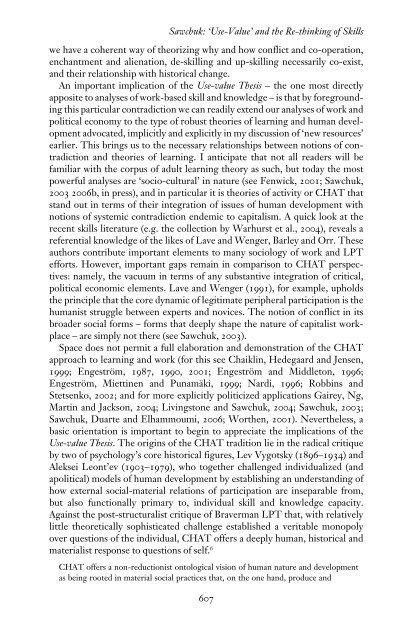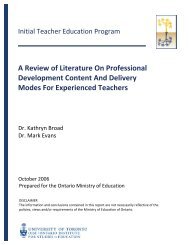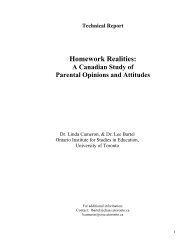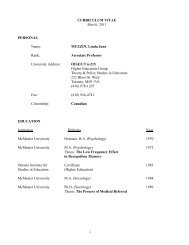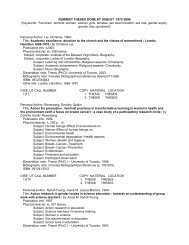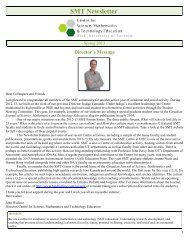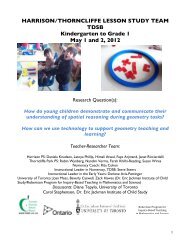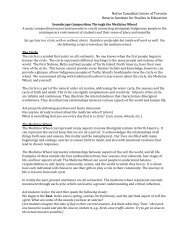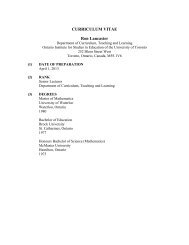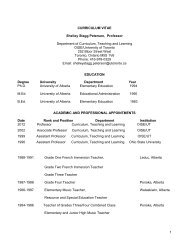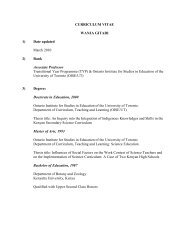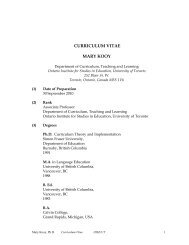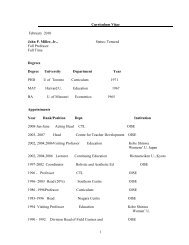'Use-Value' and the Re-thinking of Skills, Learning and the Labour ...
'Use-Value' and the Re-thinking of Skills, Learning and the Labour ...
'Use-Value' and the Re-thinking of Skills, Learning and the Labour ...
You also want an ePaper? Increase the reach of your titles
YUMPU automatically turns print PDFs into web optimized ePapers that Google loves.
Sawchuk: ‘Use-Value’ <strong>and</strong> <strong>the</strong> <strong>Re</strong>-<strong>thinking</strong> <strong>of</strong> <strong>Skills</strong>we have a coherent way <strong>of</strong> <strong>the</strong>orizing why <strong>and</strong> how conflict <strong>and</strong> co-operation,enchantment <strong>and</strong> alienation, de-skilling <strong>and</strong> up-skilling necessarily co-exist,<strong>and</strong> <strong>the</strong>ir relationship with historical change.An important implication <strong>of</strong> <strong>the</strong> Use-value Thesis – <strong>the</strong> one most directlyapposite to analyses <strong>of</strong> work-based skill <strong>and</strong> knowledge – is that by foregroundingthis particular contradiction we can readily extend our analyses <strong>of</strong> work <strong>and</strong>political economy to <strong>the</strong> type <strong>of</strong> robust <strong>the</strong>ories <strong>of</strong> learning <strong>and</strong> human developmentadvocated, implicitly <strong>and</strong> explicitly in my discussion <strong>of</strong> ‘new resources’earlier. This brings us to <strong>the</strong> necessary relationships between notions <strong>of</strong> contradiction<strong>and</strong> <strong>the</strong>ories <strong>of</strong> learning. I anticipate that not all readers will befamiliar with <strong>the</strong> corpus <strong>of</strong> adult learning <strong>the</strong>ory as such, but today <strong>the</strong> mostpowerful analyses are ‘socio-cultural’ in nature (see Fenwick, 2001; Sawchuk,2003 2006b, in press), <strong>and</strong> in particular it is <strong>the</strong>ories <strong>of</strong> activity or CHAT thatst<strong>and</strong> out in terms <strong>of</strong> <strong>the</strong>ir integration <strong>of</strong> issues <strong>of</strong> human development withnotions <strong>of</strong> systemic contradiction endemic to capitalism. A quick look at <strong>the</strong>recent skills literature (e.g. <strong>the</strong> collection by Warhurst et al., 2004), reveals areferential knowledge <strong>of</strong> <strong>the</strong> likes <strong>of</strong> Lave <strong>and</strong> Wenger, Barley <strong>and</strong> Orr. Theseauthors contribute important elements to many sociology <strong>of</strong> work <strong>and</strong> LPTefforts. However, important gaps remain in comparison to CHAT perspectives:namely, <strong>the</strong> vacuum in terms <strong>of</strong> any substantive integration <strong>of</strong> critical,political economic elements. Lave <strong>and</strong> Wenger (1991), for example, upholds<strong>the</strong> principle that <strong>the</strong> core dynamic <strong>of</strong> legitimate peripheral participation is <strong>the</strong>humanist struggle between experts <strong>and</strong> novices. The notion <strong>of</strong> conflict in itsbroader social forms – forms that deeply shape <strong>the</strong> nature <strong>of</strong> capitalist workplace– are simply not <strong>the</strong>re (see Sawchuk, 2003).Space does not permit a full elaboration <strong>and</strong> demonstration <strong>of</strong> <strong>the</strong> CHATapproach to learning <strong>and</strong> work (for this see Chaiklin, Hedegaard <strong>and</strong> Jensen,1999; Engeström, 1987, 1990, 2001; Engeström <strong>and</strong> Middleton, 1996;Engeström, Miettinen <strong>and</strong> Punamäki, 1999; Nardi, 1996; Robbins <strong>and</strong>Stetsenko, 2002; <strong>and</strong> for more explicitly politicized applications Gairey, Ng,Martin <strong>and</strong> Jackson, 2004; Livingstone <strong>and</strong> Sawchuk, 2004; Sawchuk, 2003;Sawchuk, Duarte <strong>and</strong> Elhammoumi, 2006; Wor<strong>the</strong>n, 2001). Never<strong>the</strong>less, abasic orientation is important to begin to appreciate <strong>the</strong> implications <strong>of</strong> <strong>the</strong>Use-value Thesis. The origins <strong>of</strong> <strong>the</strong> CHAT tradition lie in <strong>the</strong> radical critiqueby two <strong>of</strong> psychology’s core historical figures, Lev Vygotsky (1896–1934) <strong>and</strong>Aleksei Leont’ev (1903–1979), who toge<strong>the</strong>r challenged individualized (<strong>and</strong>apolitical) models <strong>of</strong> human development by establishing an underst<strong>and</strong>ing <strong>of</strong>how external social-material relations <strong>of</strong> participation are inseparable from,but also functionally primary to, individual skill <strong>and</strong> knowledge capacity.Against <strong>the</strong> post-structuralist critique <strong>of</strong> Braverman LPT that, with relativelylittle <strong>the</strong>oretically sophisticated challenge established a veritable monopolyover questions <strong>of</strong> <strong>the</strong> individual, CHAT <strong>of</strong>fers a deeply human, historical <strong>and</strong>materialist response to questions <strong>of</strong> self. 6CHAT <strong>of</strong>fers a non-reductionist ontological vision <strong>of</strong> human nature <strong>and</strong> developmentas being rooted in material social practices that, on <strong>the</strong> one h<strong>and</strong>, produce <strong>and</strong>607


